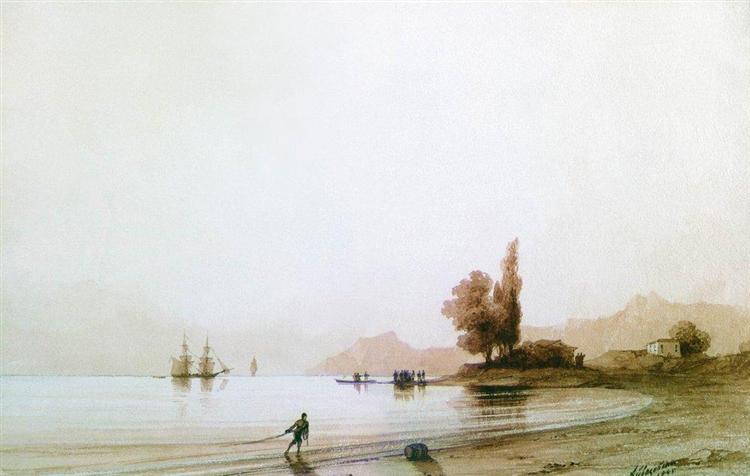Description
In the work "Vista on the rocky coast" of Ivan Aivazovsky, painted in 1845, the artist's exceptional domain is manifested on the representation of the sea and its surroundings, a land in which Aivazovsky stood out and established his reputation. This painting immerses us in an evocative coastal view, where the convergence between the earth and the ocean is captured with such a mastery that transmits both serenity and the inherent force of nature.
At first glance, one cannot avoid being captivated by the exquisite color palette selected by Aivazovsky. The chromatic consistency he uses manages to present a perfect harmonization between heaven and the sea. Its predominant blue tones are nuanced by touches of bright white that suggest waves and foam, while the horizon, far from being a mere dividing line, becomes a vital element that connects sky and sea in a sublime dance of tones.
The composition of the work is equally remarkable. Using the diagonal line of the rocks in the foreground, Aivazovsky directs the viewer's gaze to the ocean, insinuating that the true vastness of the scene unfolds beyond the visible field of the canvas. Such disposition is not accidental; reinforces the feeling of depth and expands the perception of the natural space that the artist presents.
A no less impressive element is the way Aivazovsky treats the interaction of light with natural elements. The lighting seems to come from the right, bathing the rocks and the water in a light that accentuates every detail, illustrating the painter's deep knowledge about how sunlight can transform a marine scene. The almost ethereal quality of the light that permeates the scene ensures that each element, from the rocks in the foreground to the waves in the background, is part of a cohesive and dynamic whole.
In "view on the rocky coast," there are no human figures, which is a reflection of the romantic theme of the marine landscape, highlighting the powerful presence of nature in the absence of the human being. This omission of human figures serves to increase the emphasis on the magnificence of the maritime environment, suggesting a pure and selfless contemplation of the natural world.
Ivan Aivazovsky, born in Crimea in 1817, is known for his unique ability to capture the essence of the sea. Strongly influenced by his academic training in St. Petersburg and his extensive trips, he knew how to merge academic rigor with a romantic sensitivity that overflows in his marine works. Its technique, which includes an almost transparent application of layers of paint that provide amazing authenticity to its waves and skies, is visible in this 1845 work.
Similar works of Aivazovsky, such as "The Ninth Ola" or "View of Constantinople and Bosphorus", also reveal their mastery in combining the majesty of the sea with visual narratives full of drama and poetry. Both make use of a rich and varied palette, although "seen on the rocky coast" stands out for its quieter and more meditative approach to the same theme.
In summary, "view of the rocky coast" of Ivan Aivazovsky is a jewel of marine art that encapsulates not only the technical skill of the artist but also his extraordinary ability to evoke the strength and beauty of the sea. It is a work that invites the introspection and celebration of nature in its purest state, a representation that continues to resonate deeply in the hearts and minds of contemporary spectators.
KUADROS ©, a famous paint on your wall.
Hand-made oil painting reproductions, with the quality of professional artists and the distinctive seal of KUADROS ©.
Art reproduction service with satisfaction guarantee. If you are not completely satisfied with the replica of your painting, we refund your money 100%.

